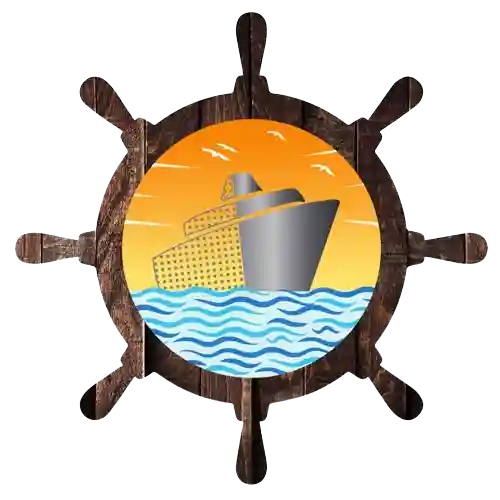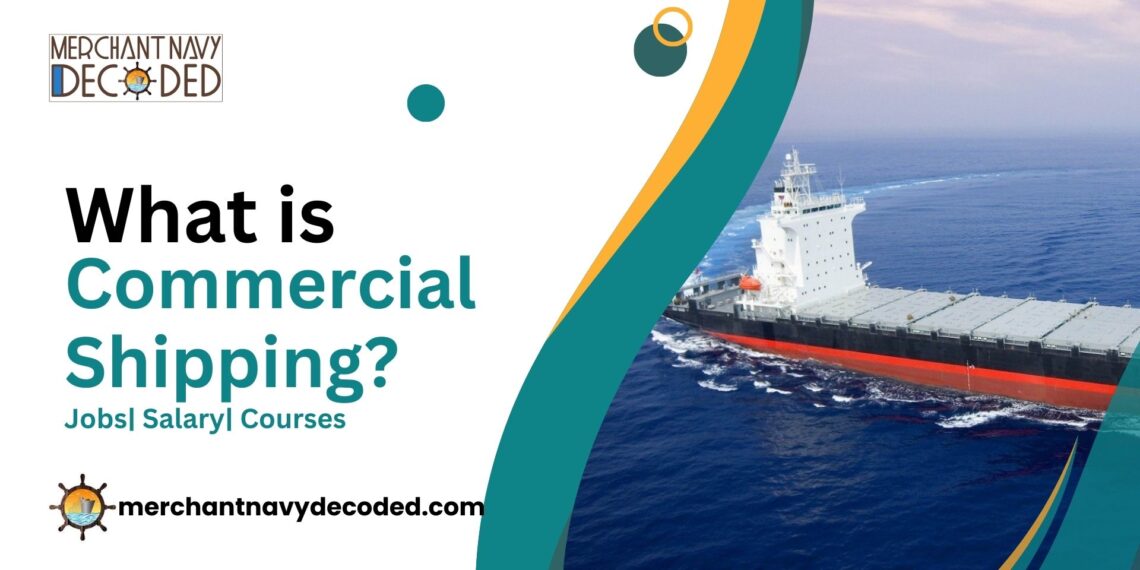What is Commercial Shipping?
Overview
- Commercial Shipping Careers: Learn how commercial shipping works around the world and what kinds of jobs it offers. You will see how this industry is exciting and rewarding.
- How Commercial Shipping Works: Find out how commercial shipping operates before and after a deal is made. You will learn about the different tasks, problems, and changes in this industry.
- Commercial Shipping Jobs and Views: Discover the different jobs you can do in commercial shipping, from beginner to expert. You will also learn how people from different countries see this industry.
- Types of commercial shipping: Explore various types of commercial shipping.
1:- What is Commercial Shipping?
Commercial shipping refers to the business of transporting goods, commodities, and materials by sea for trade and commerce. It is a crucial element of the global economy, facilitating the movement of goods between different countries and regions. Commercial shipping involves the use of ships or vessels to transport various types of cargo across oceans, seas, and waterways.
Commercial shipping also offers the opportunity for seafarers to shift from ship to shore. To learn more about the opportunity in commercial shipping and various other shore departments, you can check out our free Ship to Shore Guidance Series.
2:- Key Features of Commercial Shipping Include:
- Types of Cargo: Commercial shipping accommodates a wide range of cargo, including raw materials, finished goods, machinery, consumer products, and energy resources.
- Vessels: Different types of vessels are employed in commercial shipping, each designed for specific cargo and routes. Common vessel types include bulk carriers, container ships, tankers, and general cargo ships.
- Routes and Trade Lanes: Shipping routes, also known as trade routes or trade lanes, are the paths vessels take between ports. Major trade routes are strategic waterways connecting major ports and facilitating the flow of goods between continents. Examples include the Panama Canal, the Suez Canal, and the Strait of Malacca.
- Freight Rates: Commercial shipping operates on a business model where shipowners provide vessel services to charterers. Freight rates, the cost of hiring a ship to transport cargo, are influenced by market conditions, vessel availability, and the demand for shipping services.
- Regulations and Compliance: The international shipping industry is subject to various regulations and standards set by organizations like the International Maritime Organization (IMO).
- Economic Impact: Commercial shipping is a significant economic driver and plays a crucial role in global trade. The efficiency and reliability of shipping routes impact the cost and availability of goods in various markets.
- Technological Advances: The shipping industry has witnessed technological advancements, including the use of digital navigation systems, satellite communication, and innovations in vessel design for increased efficiency and environmental sustainability.
- Risk Management: Shipping involves inherent risks, including weather-related challenges, navigation hazards, and the potential for accidents. Risk management practices, including insurance and safety protocols, are essential components of commercial shipping.
3:- Operations in Commercial Shipping
3.1:- Prefix (Pre-Fixture)
- Market Analysis:
- Conduct thorough market analysis to understand demand and supply dynamics for specific types of cargo.
- Evaluate prevailing freight rates, market trends, and economic indicators affecting the shipping industry.
- Negotiation and Chartering:
- Engage in negotiations with potential charterers or cargo owners.
- Finalize charter agreements, considering terms, duration, and rates.
- Vessel Positioning:
- Strategically position the vessel based on market demands and upcoming contracts.
- Optimize the vessel’s location for potential chartering opportunities.
- Legal and Documentation:
- Ensure compliance with legal requirements and regulations related to the specific type of cargo.
- Complete necessary documentation, including charter parties and permits.
3.2:- Post-Fixture
- Claims and Disputes Resolution:
- Address any claims or disputes arising from damages, delays, or other issues during the voyage.
- Work towards amicable resolutions with charterers, cargo owners, or other relevant parties.
- Maintenance and Inspection:
- Conduct post-voyage inspections to assess the condition of the vessel and identify any maintenance or repair needs.
- Schedule and perform necessary maintenance to ensure the vessel’s readiness for future voyages.
- Financial Settlement:
- Finalize financial settlements with charterers, including payment of hire, demurrage, or other relevant charges.
- Ensure accurate documentation of financial transactions and compliance with contractual terms.
- Vessel Positioning for Next Charter:
- Strategically position the vessel for potential future charters based on market forecasts and cargo demand.
- Engage in pre-fixture activities for upcoming voyages.
4:- Skills Required in Commercial Shipping

4.1:- Positive Attitude
- Description: A positive attitude is foundational for success in the maritime industry. It involves approaching challenges with optimism, adaptability, and a proactive mindset.
- Significance: In the ever-changing and sometimes challenging maritime environment, a positive attitude helps navigate uncertainties and maintain focus on goals.
4.2:- Effective Communication Skills
- Description: Strong communication skills, both verbal and written, are essential for conveying information clearly and fostering effective collaboration.
- Significance: Clear communication is crucial for coordinating with crew members, interacting with stakeholders, and ensuring seamless operations during the pre-fixture, operations, and post-fixture phases.
4.3:- Networking Abilities
- Description: Networking involves building and maintaining professional relationships within the maritime industry, including with shipowners, charterers, brokers, and other key players.
- Significance: A robust network opens doors to opportunities, whether in securing charters, accessing market insights, or collaborating on ventures. Networking enhances visibility and credibility within the industry.
4.4:- Adaptability and Ability to Sustain at Lower Salary
- Description: The ability to adapt to changing conditions and sustain during the initial phase of a potentially lower salary is vital.
- Significance: The maritime industry may present challenges, especially early in one’s career. Adaptability and financial resilience during the learning phase contribute to long-term success.
4.5:- Problem-Solving Skills
- Description: Problem-solving skills involve the ability to analyze situations, identify challenges, and implement effective solutions.
- Significance: In commercial shipping, unforeseen issues can arise during operations. Problem-solving skills are crucial for addressing challenges promptly and ensuring the smooth progression of voyages.
5:- Salary in Commercial Shipping

1. Pre-Fixture:
- Operations Level: Salary at the operations level can start as low as 60,000 per month (7.2LPA), reflecting the entry-level positions.
- Master Level: As one joins at higher ranks, such as Master (Captain), the salary can go up to 1 lakh per month (1lpm).
- Career Progression: Although salaries are lower at the beginning of a career, pre-fixture roles provide a foundation for broader skill development and advancement to higher-paying positions. Experienced professionals may earn up to 2 crores per annum.
2. Operations:
- Assistant Voyage Manager: Salaries for roles like Assistant Voyage Manager at the operations level typically start at 12 to 13 lakhs per annum (12-13 lpa).
- Chief and Master: As professionals advance to Chief Mate and Master positions, salaries can increase, with Masters potentially earning up to 40 lakhs per annum (40 lpa).
- Career Progression: While salaries at the operations level are relatively moderate, career progression in these roles may be slower compared to other segments of the industry.
3. Post-Fixture:
- Claims Jobs: Salaries in post-fixture roles, such as claims management, can vary. Starting salaries may be around 12 lakhs per annum (12 lpa) and can go up to 20-25 lakhs per annum (20-25 lpa) with experience.
- Career Progression: While salaries in post-fixture roles can be competitive, career progression may not be as rapid as in some other areas of commercial shipping.
6:- How to Apply in Commercial Shipping?
6.1:- Placement Consultants:
- Role: Engage with maritime placement consultants who specialize in connecting maritime professionals with suitable job opportunities.
- Advantages: Placement consultants often have industry-specific knowledge and can assist in matching skills with available positions.
6.2:- Directly to Companies:
- CV and LinkedIn Profile: Craft a compelling CV and maintain an updated LinkedIn profile showcasing your skills, qualifications, and experience.
- Application Process: Apply directly to shipping companies through their official websites or by contacting their HR departments.
6.3:- Industry Job Portals:
- Websites: Explore industry-specific job portals dedicated to maritime and shipping careers.
- Job Listings: Regularly check and apply for relevant positions listed on these portals.
6.4:- Networking:
- Professional Networks: Leverage professional networks within the maritime industry, including colleagues, peers, and industry events.
- Online Platforms: Join relevant groups on professional networking platforms to stay informed about job opportunities.
6.5:- Maritime Recruitment Events:
- Career Fairs: Attend maritime career fairs and recruitment events to connect with representatives from shipping companies.
- Networking Opportunities: Take advantage of networking opportunities at these events to make direct contacts with industry professionals.
7:- Opportunities in India
In recent years, there has been a rise in shore-based opportunities for maritime professionals in India, with multinational companies establishing offices there. Roles such as vessel operations and claims management are in demand. While India offers lucrative prospects, global hubs like Singapore, the UK, and China also attract professionals for their diverse career paths and market exposure. Nonetheless, India’s emergence as a back-office hub highlights its increasing significance in the maritime industry, providing professionals with a range of domestic and international opportunities.
When we talk about commercial shipping there is one thing that strikes to a lot of people which is Ship Brokering and Ship Chartering. It holds immense opportunities for seafarers who want to shift from ship to shore. To learn more about ship brokering and chartering, CLICK HERE to read our dedicated blog on the topic.
8:- Conclusion
In conclusion, a career in commercial shipping offers a dynamic and globally connected professional journey. From the challenges of navigating operational intricacies to the satisfaction of contributing to international trade, professionals in this field can anticipate a fulfilling and ever-evolving experience. The industry’s emphasis on safety, compliance, and continuous learning underscores its commitment to excellence.
Disclaimer :- The opinions expressed in this article belong solely to the author and may not necessarily reflect those of Merchant Navy Decoded. We cannot guarantee the accuracy of the information provided and disclaim any responsibility for it. Data and visuals used are sourced from publicly available information and may not be authenticated by any regulatory body. Reviews and comments appearing on our blogs represent the opinions of individuals and do not necessarily reflect the views of Merchant Navy Decoded. We are not responsible for any loss or damage resulting from reliance on these reviews or comments.
Reproduction, copying, sharing, or use of the article or images in any form is strictly prohibited without prior permission from both the author and Merchant Navy Decoded.



